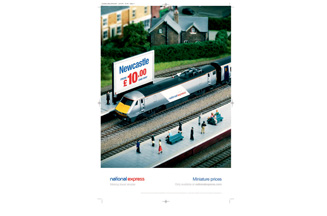
For a brand seemingly trapped in the post-war era - a 90s musical tribute from The Divine Comedy excepted - National Express has worked hard to make its mark in an age of 'integrated transport'. However, it has not always been successful.
Images of charabanc trips to the seaside and skint students returning home with bags of dirty laundry persisted even after the business, once part of the state-owned National Bus Company, was privatised in the 80s. These were finally laid to rest in 1996, when it entered the rail market with the acquisition of Gatwick Express and Midland Mainline.
Two years later National Express moved into the US transport market with the acquisition of Durham School Services. Then, in 2005, it extended into Spain with the purchase of bus and coach operator Alsa.
However, its foray into the rail market has, arguably, proved the most controversial. The company has been forced to hand back its franchise for the East Coast Main Line, which runs from London to several Scottish destinations, because falling passenger numbers led to unsustainable losses. The government is expected to take over control of the route at the end of the year.
Has National Express extended itself too far and would it have been better sticking to its core business of operating UK bus and coach routes?
We asked Meera Chandra, managing director of Syzygy, who has worked on the Sky Travel account, and Emma Harris, sales and marketing director of Eurostar.
Diagnosis Two industry experts suggest how National Express can get back on track
Meera Chandra managing director, Syzygy
National Express did well to distance itself from being the preserve of students and grannies, but recently it has taken a battering, and is fighting tooth and nail to stave off takeover bids from competitors.
Eyebrows have been raised, not only over implementation efforts, but also its financial health and business approach.
Providing a public service that is unreliable, expensive and a fundamental part of many people's lives, is a tough draw. The scrutiny must be crushing and public transport is second only to the weather as a subject of complaint.
The website is poor. Its only information service is an email bulletin, which isn't publicised on the home page, and it feels out of step with the way people use digital, particularly on the move. Clearly, National Express must address this.
Its distinctive ad campaign focuses on 'miniature prices', but where is the incentive to take journeys? There is no focus on the actual travel experience, and while ads are themed around possible destinations, the emphasis on low prices is easily missed.
Remedy
- Create an aggressive online social media strategy. National Rail tweets and has an iPhone application that tracks service information in real time. If there are delays, provide as much information as quickly as possible.
- The best way to counter negative PR is a concerted community-led online and PR effort to mobilise people into generating ideas and spreading positive word of mouth. It's essential to create a credible community that believes change is possible.
- Create a specialist website hosting the changes with progress statistics and updates with an open and inclusive tone of voice.
Emma Harris sales and marketing director, Eurostar
So, from a brand perspective what options are open to National Express now? Should it focus on the core coach business and remove its association with rail. Ignore the East Coast situation or face it head on? Go quiet and hope consumers forget or invest in trying to get them back onside?
Knowing what we know about current consumer behaviour, I believe National Express has an opportunity to more than recover from this situation.
Trust is the trump card and established brands, such as M&S and Hovis are playing on their heritage. In the transport sector, travellers are also migrating toward brands with longevity and a trusted reputation.
National Express' most obvious way forward would be to use a heritage positioning to connect with the public. Consumers today are probably unaware of the origins of the business as the first co-ordinated express coach company in the UK. It has a real opportunity to communicate what it has achieved for the nation. Perhaps, it should pose the question: what would the country be like without National Express?
Remedy
- Position the brand as a national treasure, connecting Britain.
- Remind the public how National Express got the nation moving and represent travelling with the company as travelling in the spirit of our time.
- Build on the 'Making Travel Simpler' message with a focus on the emotional elements of its service.
- Use very local communications to connect with specific communities.
- Combine the legacy message with how National Express is using technology such as mobile ticketing and text alerts, and focus on sustainability.

